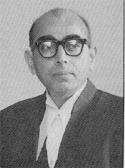A. N. Ray
Ajit Ray | |
|---|---|
 | |
| 14thChief Justice of India | |
| In office 26 April 1973 – 28 January 1977 | |
| Appointed by | V. V. Giri |
| Preceded by | Sarv Mittra Sikri |
| Succeeded by | Mirza Hameedullah Beg |
| Personal details | |
| Born | 29 January 1912 |
| Died | 25 December 2009(aged 97) Kolkata,India |
| Nationality | Indian |

Ajit Nath Ray(29 January 1912 – 25 December 2009) was theChief Justiceof theSupreme Court of Indiafrom 25 April 1973 till his retirement on 28 January 1977.
Ray was the lone dissenter among the eleven Supreme Court judges that examined the constitutionality of the Bank Nationalization Act, in 1969. He had come to his appointment to the Court viaPresidency College,Calcutta,Oriel College,Oxford,Gray's Inn,and theCalcutta High Court.[1]His son JusticeAjoy Nath Raywas the Chief Justice of theAllahabad High Court.[2]
Controversial appointment
[edit]In August 1969, he was appointed as Judge of the Supreme Court of India, and became Chief Justice of India in April 1973.
His appointment as CJI came on the heels of a dissenting opinion in the Keshavanand Bharti case which gave rise to theBasic structure doctrineof the Indian Constitution.
This appointment superseded three senior judges of the Supreme Court,Jaishanker Manilal Shelat,AN Grover andK. S. Hegde,and was viewed as an attack on the independence of the Judiciary. This was unprecedented in Indian legal history, and has been called the "blackest day in Indian democracy".[3]It was marked by widespread protests by bar associations and legal groups across India. The protests continued for many months and on 3 May 1976 all legal groups in India observed a "Bar solidarity day" and stopped from work.[3]
JusticeMohammad Hidayatullah(who was CJI earlier) remarked that "this was an attempt of not creating 'forward looking judges' but the 'judges looking forward' to the plumes of the office of Chief Justice".[3]The process continued with the controversial appointment of Justice Beg supersedingHans Raj Khannain 1977.
After becoming Chief Justice, A.N. Ray more than shared the government's economic viewpoint – he developed an adulatory attitude towards Prime MinisterIndira Gandhi.He made himself amenable to her influence by telephoning her frequently, and also ask her personal secretary's advise on simple matters, conveying the impression that Prime Minister's views might be heard concerning an ongoing court-case.[4]
Ultimately, the powers of the Judiciary over judicial appointments was re-established under theMorarji Desaigovernment withShanti Bhushanas law minister through various Constitutional amendments.
Additional District Magistrate of Jabalpur v. Shiv Kant Shukla (also known as theHabeas corpuscase) is a major decision during his tenure as Chief Justice.
References
[edit]- ^Austin, Granville (1999).Working a Democratic Constitution – A History of the Indian Experience.New Delhi: Oxford University Press. pp.216–217.ISBN019565610-5.
- ^Socialist India.Indian National Congress. All India Congress Committee. 1974. p. 2.
- ^abc"Supreme Court Bar Association".Archived fromthe originalon 4 October 2009.Retrieved16 November2009.
- ^Austin, Granville (1999).Working a Democratic Constitution – A History of the Indian Experience.New Delhi: Oxford University Press. pp.290.ISBN019565610-5.
External links
[edit]
